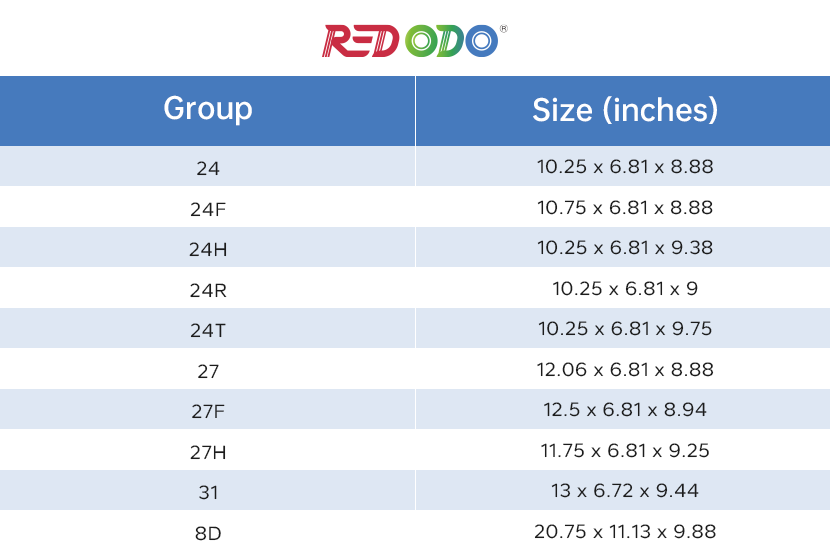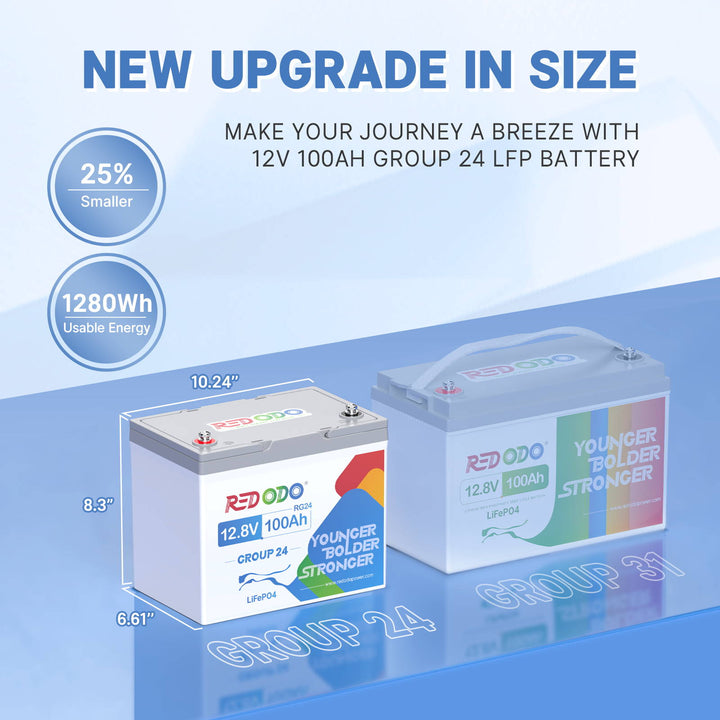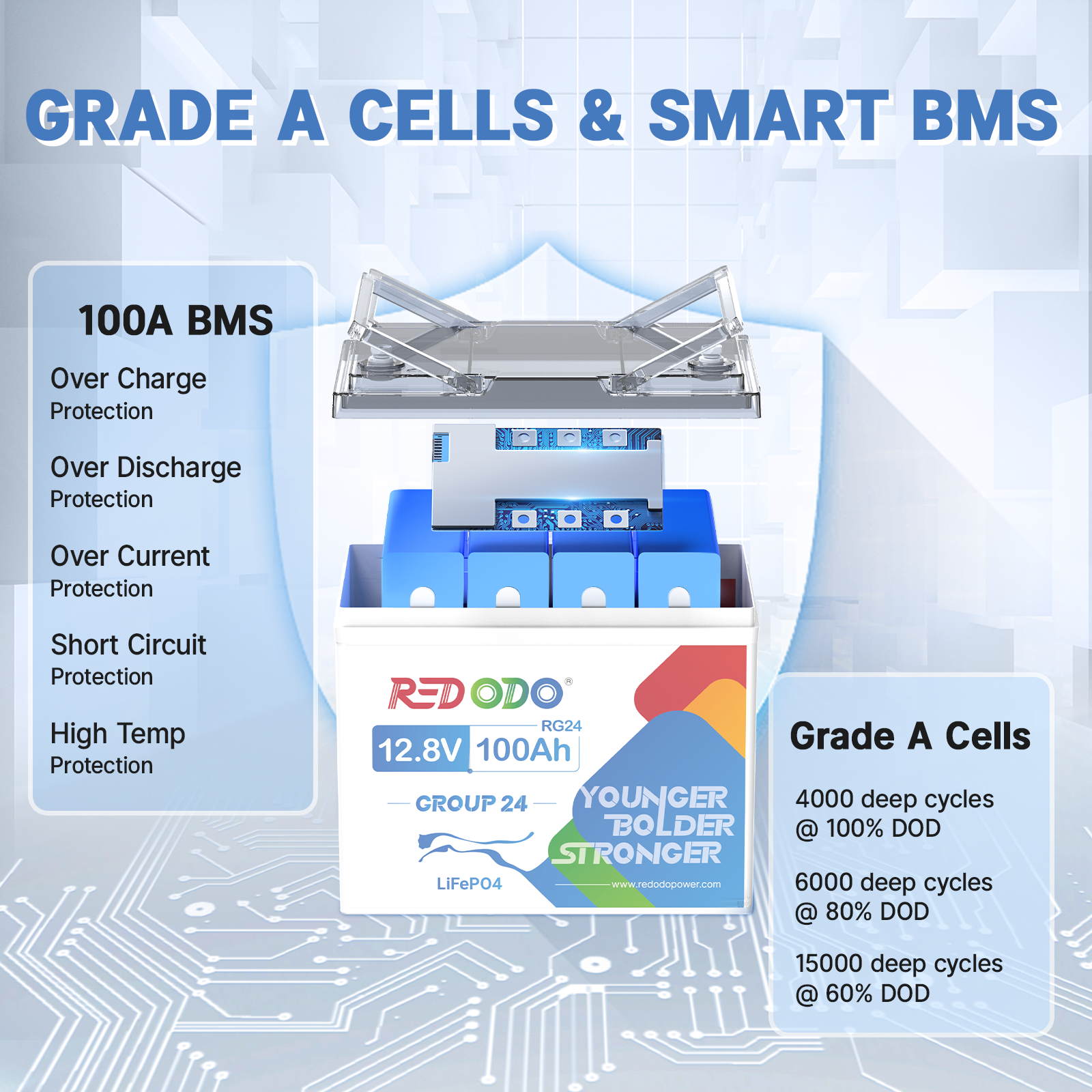What is A Group 24 Battery? Dimensions and Features
Group 24 battery is a popular choice for a wide range of applications, from automotive and marine use to renewable energy systems. In this article, we’ll explore the key aspects of Group 24 batteries dimensions, features, sizes, and maintenance, helping you determine if it's the right fit for your needs.
Table of Content
- What Does Group Size Mean on A Battery?
- What is A Group 24 Battery?
- The Dimensions of Group 24 Battery
- Group 24 Battery VS Other Battery Groups Size
- Features of a Group 24 Battery
- Can Group Sizes Be Used Interchangeably?
- How Much Does a Group 24 Battery Weigh?
- Upgrade to Group 24 Lithium Battery
- Group 24 Lithium Battery Recommended
- How to Maintain Group 24 Battery?
What Does Group Size Mean on A Battery?
Group size is a standardized classification system that denotes a battery's physical dimensions and terminal location, determining its compatibility with specific vehicles or equipment. This industry-wide code, established by organizations like the Battery Council International (BCI) for automotive and marine batteries, ensures compatibility and interchangeability among batteries from different manufacturers. Ultimately, understanding battery group sizes is crucial for selecting the right battery to power various devices.
What is A Group 24 Battery?
BCI Group 24 battery has a wide range of applications, including large UPS systems, medical and security systems, wheelchairs, vehicles, and industrial equipment. However, they are not commonly used as starting batteries but are more frequently utilized in deep cycle standby or float applications.
Group 24 battery is one of the most prevalent battery group sizes in the market, with the commonly used chemistry being AGM (Absorbent Glass Mat) SLA (Sealed Lead Acid) batteries. However, other chemistries/types such as gel-cell batteries, flooded batteries, and even lithium-ion batteries are also available within this group.
The Dimensions of Group 24 Battery
BCI Group 24 batteries have specific dimensions that are generally 10.25 x 6.8125 x 8.875 inches (260 x 173 x 225 mm).
However, it is important to note that within the Group 24 category, there are various subgroups with slight variations in dimensions. When selecting a battery, precision is necessary to ensure it fits properly into its designated compartment. Even minor size differences can result in a battery not fitting correctly.
Here is the chart of common battery sizes:

In many cases, battery compartments have enough extra height to accommodate a Group 24 battery, which has a height of 8 7/8 inches. This means that they can generally also accommodate batteries from the Group 24T category, which have a height of 9 3/4 inches. The Group 24T battery is only 7/8 inches (or 0.875 inches, approximately 22 mm) taller than the standard Group 24 battery.
Group 24 Battery VS Other Battery Groups Size
|
Group Size |
LxWxH (inches) |
LxWxH (cm) |
|
10.25 x 6.8125 x 8.875 |
26 x 17.3 x 22.5 |
|
|
Group 27 Batteries |
12.0625 x 6.8125 x 8.875 |
30.6 x 17.3 x 22.5 |
|
13 x 6.8125 x 9.4375 |
33 x 17.3 x 24 |
|
|
Group 34 Batteries |
10.25 x 6.8125 x 7.875 |
26 x 17.3 x 20 |
|
Group 35 Batteries |
9.0625 x 6.875 x 8.875 |
23 x 17.5 x 22.5 |
|
Group 51 and 51R Batteries |
9.374 x 5.0625 x 8.8125 |
23.8 x 12.9 x 22.3 |
|
Group 65 Batteries |
12.0625 x 7.5 x 7.5625 |
30.6 x 19 x 19.2 |
|
Group 78 Batteries |
10.25 x 7.0625 x 7.3125 |
26 x 17.9 x 18.6 |
Battery compartments designed for Group 24 batteries may also be compatible with Group 34 batteries, as they have the same length and width but are one inch shorter in height. Additionally, Group 25/35 batteries have the same height of 8.875 inches (22.5 cm) as Group 24 batteries.
While they may be slightly shorter (~1.2 inches or 3 cm), they are also slightly wider by 0.0625 inches (0.16 cm). However, this width difference is so small that it can be practically ignored.
Read More: The Full Comparison of Group 24 VS Group 31 Battery
Features of a Group 24 Battery
Group 24 batteries come with a variety of features that make them suitable for different applications. Some of the key features include:
1. High Capacity and Performance
Group 24 battery offers a substantial capacity, typically ranging from 70 to 85 amp-hours (Ah). This makes it ideal for applications that require sustained power over a longer period, such as RVs, boats, and backup power systems.
2. Durability and Longevity
These batteries are designed to withstand harsh conditions and frequent cycling. Lithium-ion versions are particularly known for their durability and long lifespan, as they are less prone to damage from vibration and deep discharges compared to flooded lead-acid batteries.
3. Versatility
Group 24 batteries are versatile and can be used in various applications, including automotive, marine, RVs, solar power systems, and backup power. Their standardized size and capacity make them a go-to choice for many different uses.
4. Safety Features
Many Group 24 batteries come equipped with safety features such as spill-proof designs, low self-discharge rates, and built-in protection against overcharging and short circuits. These features enhance the safety and reliability of the batteries.
Can Group Sizes Be Used Interchangeably?
Group sizes cannot be used interchangeably without careful consideration. While some group sizes may have similar dimensions, variations in height, width, and length can impact compatibility with battery compartments or connections. It's essential to choose a battery that matches the specifications and requirements of your device or vehicle to ensure optimal performance and safety.
How Much Does a Group 24 Battery Weigh?
On average, a Group 24 battery weighs between 40 to 50 pounds (18 to 23 kg). AGM and gel versions might be heavier due to their construction and materials. For example, Redodo Group 24 LiFePO4 Battery weights only 21.6lbs, 2/3 lighter than the same capacity of AGM battery.
Upgrade to Group 24 Lithium Battery
Battery technology has significantly evolved over the years, and one of the latest and most popular advancements is the Group 24 Lithium Battery.
This type of battery offers numerous advantages over traditional lead-acid batteries, including enhanced performance, longer lifespan, and minimal maintenance requirements.
By upgrading to a Group 24 Lithium Battery, you can bid farewell to the hassle of regular maintenance, while enjoying superior power and efficiency.
High Performance
Group 24 Lithium Batteries are known for their exceptional performance. They provide higher energy density, which allows them to deliver more power per pound compared to traditional batteries. This improved efficiency ensures your devices and equipment work optimally, providing the necessary power for extended periods.
Longer Lifespan
Unlike lead-acid batteries, Group 24 Lithium Batteries have an impressively long lifespan. On average, they can last up to 10 years or more, significantly outlasting traditional battery types. This means fewer replacements and reduced costs in the long run, making them an excellent investment.
Minimal Maintenance
One of the biggest advantages of upgrading to a Group 24 Lithium Battery is the minimal maintenance required. Unlike lead-acid batteries that demand regular upkeep and monitoring, lithium batteries are virtually maintenance-free. You no longer need to worry about checking the electrolyte levels or dealing with corrosive spills. This convenience saves you time, energy, and ensures peace of mind.
No Need for specific Charging Habits
With lead-acid batteries, adhering to specific charging habits such as avoiding deep discharges and fully recharging regularly is crucial to maintaining their longevity. However, Group 24 Lithium Batteries are not affected by these concerns. They can withstand deep discharges without taking a toll on their life expectancy. You can enjoy the freedom of using your battery without worrying about constantly monitoring its charging habits.
Suggest reading: Can I Charge LiFePO4 battery with a normal charger?
Easy Storage and Handling
Group 24 Lithium Batteries have superior storage capabilities. They are not affected by self-discharge as lead-acid batteries are, allowing you to store them for long periods without worrying about their power depleting rapidly. Additionally, they can be installed in any orientation, making them versatile and easy to handle for various applications.
Enhanced Safety Features
Lithium batteries come with built-in safety features that protect against overcharging, overheating, and short circuits. They offer greater stability and reliability, reducing the risk of accidents or damage to your devices. These safety measures provide peace of mind, particularly in critical applications.
Group 24 Lithium Battery Recommended
1. Redodo 12V 100Ah Group 24 LiFePO4 Battery
Redodo 12V 100Ah Group 24 LiFePO4 Battery, the perfect power solution designed specifically for most RV models. This advanced lithium battery offers exceptional performance, lightweights (21.6 lbs), extended lifespan, and minimal maintenance requirements.
The Redodo Group 24 LiFePO4 Battery provides reliable and efficient power delivery, ensuring optimal performance for all your RV equipment.
Say goodbye to frequent replacements, as this battery boasts a long lifespan, saving you time and money in the long run. Forget about checking electrolyte levels or dealing with corrosive spills, as this maintenance-free battery simplifies your RV experience. It can withstand deep discharges without compromising its lifespan, allowing for more flexible charging habits.
Rest easy knowing that this battery is equipped with built-in safety features, protecting against overcharging and short circuits.
Upgrade to the Redodo 12V 100Ah Group 24 LiFePO4 Battery and experience the convenience, reliability, and peace of mind it brings to your RV adventures.

2. Redodo 12V 100Ah Group 24 Battery with Bluetooth
The Redodo Group 24 Battery with Bluetooth combines cutting-edge technology with superior performance, offering exceptional reliability and convenience. Its compact Group 24 size makes it versatile and easy to install, even in tight spaces. The battery features lightweight design — 39% lighter than traditional lead-acid batteries — ensures portability without sacrificing power.
Its Bluetooth 5.0 connectivity allows you to monitor vital metrics like voltage, capacity, cycle count, and temperature directly from Redodo App. The advanced BMS provides 20+ built-in protections, including low-temperature charging cut-off and auto overload recovery, making it incredibly safe and reliable for demanding outdoor applications.
With over 4,000 charge cycles and 1280Wh energy capacity, this battery delivers long-lasting performance, significantly outliving traditional batteries.

How to Maintain Group 24 Battery?
Maintaining a Group 24 battery is crucial for ensuring its longevity and optimal performance. Here are some essential tips to help you maintain your Group 24 battery:
Conclusion
Group 24 batteries are a reliable and versatile power source suitable for a wide range of applications. Their standardized dimensions, high capacity, and durable design make them a popular choice for automotive, marine, RV, and backup power uses. This kind of battery can provide the dependable power you need.
Additionally, upgrading to a Group 24 Lithium Battery offers numerous benefits, especially when it comes to minimizing maintenance requirements. With their high performance, longer lifespan, and minimal need for upkeep, these batteries provide a hassle-free solution for various applications.

Redodo

Redodo
Join Redodo
Related Post

What Is the Best Marine Battery: Type, Size, and Buying Guide

How to Plan a Perfect Off-Grid RV Camping Trip: 2026 Guide

How to Charge a 24V LiFePO4 Battery? Best Practice

Redodo 12V 320Ah Mini Battery Review: 4kWh Power for Multi-Day RV Camping










